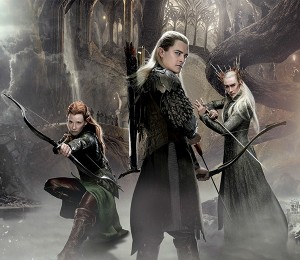 Orlando Bloom has been talking about his reaction to stepping back into Middle-earth in an interview with Collider.com,
Orlando Bloom has been talking about his reaction to stepping back into Middle-earth in an interview with Collider.com,
“It was sheer joy. It was also a little bit of, “Oh, my word.” This is ten years later, I’m ten years older and how’s this all going to work? I quite literally was like, “Can I just try on my old costume just for posterity of it all?” It was amazing that Pete was back at the helm of this movie, and it was amazing that I got a call to say we would love you to be a part of the film. I was just full of excitement. I was obviously like, “Ooh! This is going to be interesting to make the transition as an Elf being ten years older as myself, as an actor, going in to playing a character that would be younger, but as Elves are kind of ageless anyway we’ve managed to bridge the gap.”
About differences between Legolas in The Hobbit and in The Lord of the Rings, Orlando says,
“[…] Essentially the Woodland Realm Elves, which is where Legolas is from, and my father being Thranduil, the king of those Elves, are a particular type of Elf as described by Tolkien to be… I’m not going to quote him correctly, but they are different from the Lothlorien and the Rivendell elves. They’re more militant if you like. Legolas in Lord Of The Rings was sent as a bridge from his people into the world of dwarves and humans and wizards and everything else. This is an introduction into the Woodland Realm Elves. Obviously we meet my father, Thranduil, who is a very powerful and strong character who is very particular in his vision of who the Elves are, who the Woodland Elves are, specifically. They are kind of, like I said, a militant group, the Woodland Realm Elves. So I think that the opportunity that Pete and Philippa and Fran and the writers and Pete saw was to create– I think there was a desire for Legolas to come back. They felt that the fans would appreciate seeing Legolas in the Woodland Realm, and there was an opportunity to create a father-son, a prince versus king dynamic that would be interesting and serve the story.”
In The Desolation of Smaug we’ll be able to see also new dynamics between Legolas and his father, Thranduil.
“[…] when I say to you there is a certain rivalry– A prince versus a king, a father versus a son, there’s definitely a bit of father-son rivalry, prince-king rivalry that forwards the story, I don’t really want to elaborate on it more than that, but it makes for a more interesting dynamic. Thranduil being the king of the Woodland Realm and, as I’ve said, those Elves being more of a militant group of Elves. Knowing that Legolas goes on to be a bridge, like an architect for peace between the Elves and the rest of the world, you might be able to guess there might be a little bit of me trying to understand more of what the plight of the rest of the world is and therefore somewhat coming up against odds with my father. Does that help?”
You can read it in full interview at Collider.com.
The Hobbit: The Desolation of Smaug is in cinemas from 13 December, 2013.


